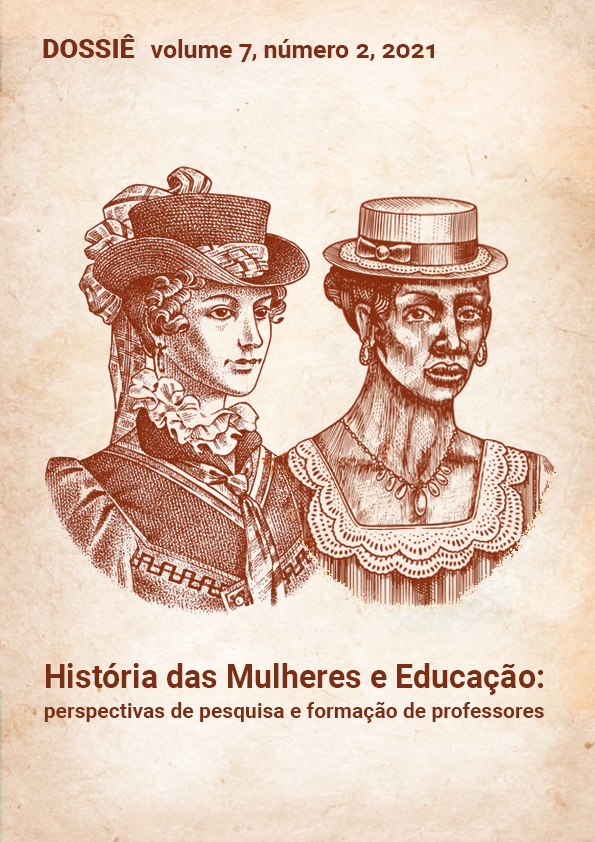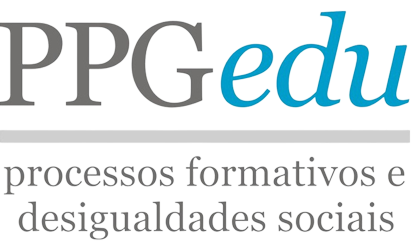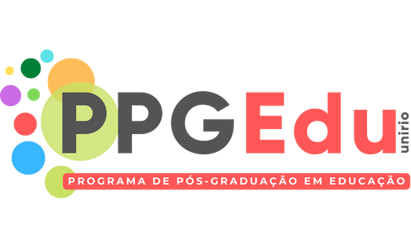Crip Camp e a educação especial e inclusiva sob rasura
DOI:
https://doi.org/10.12957/riae.2021.63455Palavras-chave:
Crip Camp, Educação Especial, Educação InclusivaResumo
Este trabalho tem como objetivo discutir a relação entre três aspectos do filme Crip Camp: A Disability Revolution e a Educação Especial e Inclusiva enquanto produção de rasuras. Partindo da desconstrução derridiana, circunscreve esses dois polos numa cena de escritura para explicitar as dyferenças (différances) entre eles e as rasuras por eles feitas. Discute o novo humanismo, a narrativa fílmica como encontro sexual, a lei como elemento teleológico e como o conceito de deficiência se relaciona com os de inclusão e acessibilidade. Mostra as rasuras como locais de reflexão para a Educação Especial e Inclusiva. Conclui apontando o papel de pesquisas com o viés pós-colonial e a possibilidade de emergência de campos do saber à luz da diversidade de deficiências.Referências
AINSCOW, Melvin. Inclusion and equity in education: Making sense of global challenges. Prospects, n. 49, pp. 123–134, september, 2020.
AINSCOW, Melvin. The Development of Inclusive Education Systems. In: AINSCOW, Melvin. Understanding the Development of Inclusive Schools. 2nd. London and Philadelphia: Falmer Press, 2002. p. 179-217.
AINSCOW, Melvin; BOOTH, Tony. From Them to Us: An international study of inclusion in education. 2nd. London and New York: Routledge, 2005.
AINSCOW, Melvin; BOOTH, Tony. Index of Inclusion: developing learning and participation in schools. London: CSIE, 2002.
AINSCOW, Melvin; CLARKE, Paul; TOWSEND, Tony. Third millennium schools: a world of difference in effectiveness and improvement. Lisse/Netherlands: Swets & Zeitlinger, 1999.
AINSCOW, Melvin; MILES, Susie. Responding to Diversity in Schools: An inquiry-based approach. London and New York: Routledge, 2011.
AINSCOW, Melvin; WEST, Mel. The challenge of urban school improvement. In: AINSCOW, Melvin; WEST, Mel. Improving Urban Schools: Leadership and Collaboration. New York: Open University Press, 2006. p. 1-13.
AMARAL, Marcelo Pereira do; STAUBER, Barbara. Access to and Accessibility of Education: An Analytic and Conceptual Approach to a Multidimensional Issue. European Education, v. 47, p. 11-25, 2015.
ARMSTRONG, Felicity. Spaced Out: Policy, Difference and the Challenge of Inclusive Education. New York, Boston, Dordrecht, London, Moscow: Kluwer Academic Publishers, 2003.
ARMSTRONG, Felicity; BARTON, Len. Policy, Experience and Change: Cross-Cultural Reflections on Inclusive Education. London: Springer, 2008.
ARMSTRONG, Felicity; RODRIGUES, David. A inclusão nas escolas. Lisboa: Fundação Manuel dos Santos, 2014.
BARTHES, Roland. O grão da voz. São Paulo: WMF Martins Fontes, 2004.
BEAUREGARD, Line; FOUGEYROLLAS, Patrick. Disability: An Interactive Person-Environment Social Creation. In: ALBRECHT, Gary; SEELMAN, Katherine; BURY, Michael (Editors). Handbook of Disability Studies. London: Sage Publications, 2001. p. 171-194.
CAMPBELL, Fiona Kumari. Contours of Ableism: the production of Disability and Abledness. New York: Palgrave Macmillan, 2009.
CRIP Camp: A Disability Revolution. Direção: Nicole Neunham e James Lebrecht. Estados Unidos: Higher Ground Productions, 2020. 1h41min.
DAVIS, Lennard. The End of Identity Politics and the Beginning of Dismodernism: On Disability as an Unstable Category. In: DAVIS, Lennard. The Disability Studies Reader. 2nd. ed. London and New York: Routledge, 2006. p. 231-242.
DEPPE-WOLFINGER, Helga. Integrationskultur- am Anfang oder am Ende?. In: SANDER, Alfred; SCHNELL, Irmtraud. Inklusive Pädagogik. Bad Heilbrunn: Julius Klinkhardt, 2004. p. 23-40.
DERRIDA, Jacques. De la grammatologie. Paris: Les Éditions Minuit, 1967a.
DERRIDA, Jacques. L’écriture et la différence. Paris: Aux Éditions du Seuil, 1967b.
DERRIDA, Jacques. Posições. Belo Horizonte: Autêntica, 2001.
ERBESOLD, Serge. Pratiques inclusives, approche polycentrée et accessibilité. Revista de Educação Especial, v. 33, p. 1-22. 2020. Disponível em: <https://periodicos.ufsm.br/educacaoespecial/article/view/52845/html>. Acesso em: 14 mai. 2021.
HEGEL, Georg Wilhelm Friedrich. Princípios da Filosofia do Direito. São Paulo: Martins Fontes, 1997.
HINZ, Andreas. Vom sonderpädagogischen Verständnis der Integration zum integrationspädagogischen Verständnis der Inklusion!? In: SANDER, Alfred; SCHNELL, Irmtraud. Inklusive Pädagogik. Bad Heilbrunn: Julius Klinkhardt, 2004. p. 41-74.
HORNBY, Garry. Inclusive special education: development of a new theory for the education of children with special educational needs and disabilities. British Journal of Special Education, v. 42, n. 3, p. 234-256, 2015.
HORNBY, Garry; KAUFFMAN, James. Inclusive Vision Versus Special Education Reality. Education Sciences, n. 10, p. 1-13, 2020.
LEROI-GOURHAN, André. El gesto y la palabra. Caracas: Ediciones de la Biblioteca/Universidad Central de Venezuela, 1971.
MANTOAN, Maria Teresa Eglér. Educação Especial na perspectiva inclusiva: o que dizem os professores, dirigentes e pais. Revista Diálogos e Perspectivas em Educação Especial, v.2, n.1, p. 23-42, Jan.-Jun., 2015.
MANTOAN, Maria Teresa Eglér. Inclusão escolar: o que é? Por quê? Como fazer? São Paulo: Moderna, 2003.
MANTOAN, Maria Teresa Eglér. Inclusão, diferença e deficiência: sentidos, deslocamentos, proposições. Inclusão Social. Brasília-DF, v. 10, n. 2, p. 37-46, 2017.
MANTOAN, Maria Teresa Eglér. O direito à diferença nas escolas: questões sobre a inclusão escolar de pessoas com e sem deficiência. Revista do Centro de Educação, n. 23, p. 1-5, 2004.
MAUSS, Marcel. Les techniques du corps. Journal de Psychologie, Paris, v. XXXII, n. 3-4, p. 1-23, mars./avril. 1936. Disponível em: <http://classiques.uqac.ca/classiques/mauss_marcel/socio_et_anthropo/6_Techniques_corps/techniques_corps.pdf>. Acesso em: 19 nov. 2020.
MCRUER, Robert. Crip Theory: Cultural Signs of Queerness and Disability. New York and London: New York University Press, 2006.
MITCHELL, David. David: Inclusive education is a multi-faceted concept, CEPS Journal, v. 5, n. 1, p. 9-30, 2015.
MITCHELL, David. Introduction: sixteen propositions of the contexts of the inclusive education. In: MITCHELL, David. Contextualizing Inclusive Education: Evaluating Old and New International Perspectives. London and New York, 2005. p. 1-21.
PLAISANCE, Éric. L’inclusion comme théorie pratique. Revista de Educação Especial, v. 33, p. 1-23. 2020. Disponível em: <https://periodicos.ufsm.br/educacaoespecial/article/view/55337/pdf>. Acesso em: 14 maio 2021.
RATH, Waldtraut. Blindenpädagogik. In: SOLAROVÁ, Svetluse. Geschichte der Sonderpädagogik. Stuttgart; Berlin; Köln; Mainz: Kohlhammer, 1983. p. 49-83.
SALEND, Spencer; DUHANEY Laurel Garrick. The Impact of Inclusion on Students With and Without Disabilities and Their Educators. Remedial and Special Education, v. 20, n. 2, March/April, p. 144-126, 1999.
SANDER, Alfred. Inklusive Pädagogik verwirklichen - zur Begründung des Themas In: SANDER, Alfred; SCHNELL, Irmtraud. Inklusive Pädagogik. Bad Heilbrunn: Julius Klinkhardt, 2004. p. 11-22.
SANSOUR, Teresa; BERNHARD, Dörte. Special needs education and inclusion in Germany and Sweden. ALTER: European Journal of Disability Research, n. 12, p. 127-139, 2018.
SASSAKI, Romeu Kazumi. Inclusão: Construindo uma sociedade para todos. Rio de Janeiro: WVA, 1999.
SCHILLMEIER, Michael. Rethinking Disability: bodies, senses, and things. New York and London: Routledge, 2010.
SHAKESPEARE, Tom. Arguing about disability: philosophical perspectives. London and New York: Routledge, 2009.
SHAKESPEARE, Tom. Disability: Rights and Wrongs. 2nd. ed. London and New York: Routledge, 2006.
SHAKESPEARE, Tom; GILLESPIE-SELLS, Kath; DAVIES, Dominic. The Sexual Politics of Disability: Untold Desires. London: Cassell, 1996.
SOLAROVÁ, Svetluse. Einleitung. In: SOLAROVÁ, Svetluse. Geschichte der Sonderpädagogik. Stuttgart; Berlin; Köln; Mainz: Kohlhammer, 1983. p. 7-11.
SOLAROVÁ, Svetluse. Sehbehindertenpädagogik. In: SOLAROVÁ, Svetluse. Geschichte der Sonderpädagogik. Stuttgart; Berlin; Köln; Mainz: Kohlhammer, 1983. p. 332-361.
WALTER, Jünger; WEMBER, Franz. Sonderpädagogik des Lernens. Göttingen; Bern; Wien; Paris; Oxford; Prag; Toronto; Cambridge; Amsterdam; Kopenhagen: Hogrefe, 2007. (Handbuch Sonderpädagogik, Band 2).
Downloads
Publicado
Como Citar
Edição
Seção
Licença
Os autores mantêm os direitos autorais dos seus trabalhos, têm permissão para publicar e distribuir seu trabalho online (ex.: em repositórios institucionais ou na sua página pessoal) a qualquer ponto antes ou durante o processo editorial, já que isso pode gerar alterações produtivas, bem como aumentar o impacto e a citação do trabalho publicado.
A aceitação do texto implica na autorização e exclusividade da Revista Interinstitucional Artes de Educar acerca do direito de primeira publicação, os trabalhos publicados estão simultaneamente licenciados com uma licença Creative Commons Atribuição-Não Comercial 4.0 Internacional 























